|
|
|
Sort Order |
|
|
|
Items / Page
|
|
|
|
|
|
|
| Srl | Item |
| 1 |
ID:
114339
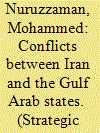

|
|
|
|
|
| Publication |
2012.
|
| Summary/Abstract |
The post-2003 Persian Gulf sub-region has witnessed intensified geopolitical conflicts and competition between Iran and the Gulf Arab states, particularly between Iran and Saudi Arabia. Scholars and experts have mostly analysed the conflicts through political and strategic prisms while neglecting their economic dimensions. This article analyses the various post-2003 conflicts between Iran and the Gulf Arab states with a focus on how economic integration or the lack thereof creates the incentives to resolve or sustain the conflicts. It concludes that low levels of trade and economic integration and the absence of an economics of cooperation between Iran and its Gulf Arab neighbours inhibit any strong initiatives to resolve the conflicts.
|
|
|
|
|
|
|
|
|
|
|
|
|
|
|
|
| 2 |
ID:
114343
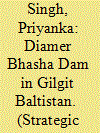

|
|
|
|
|
| Publication |
2012.
|
| Summary/Abstract |
This article is an attempt to understand India's concerns over the Diamer Bhasha dam project within the overall ambit of India's approach towards Pakistan-occupied Kashmir (PoK). It makes a holistic assessment of the feasibility of the project, the political and technical issues involved in it, the long-term strategy of Pakistan and China in the region, and the local reactions, which must inform India's future policy preferences regarding PoK. The article is divided into three parts. The first part deals with the factors that make the project controversial and these are discussed under three broad headings: location, financial constraints and geopolitical drivers. The second section outlines India's concerns-political, socio-cultural, ecological and geopolitical. The third and final section sums up the key findings of the article and suggests concrete options for Indian policy makers to readjust their overall policy on PoK in general and on the construction of the Diamer Bhasha dam in particular.
|
|
|
|
|
|
|
|
|
|
|
|
|
|
|
|
| 3 |
ID:
114342
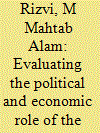

|
|
|
|
|
| Publication |
2012.
|
| Summary/Abstract |
The Islamic Revolutionary Guards Corps (IRGC) is Iran's most powerful security and military organisation, responsible for the protection and survival of the regime. Over time, the IRGC has attained a position of dominance vis-à-vis the regular army (Artesh). In due course, the Guards have also been transformed into a leading political and economic actor. The major political role of the IRGC started with the election of the reformist presidency. However, the Guards' involvement in the Iranian economy began during Rafsanjani's presidency. In view of the importance of Iran and its military, especially the IRGC, this article seeks to analyse the political and economic roles of the IRGC. The article argues that the IRGC's political and economic role is likely to increase due to its unique relationship with Iranian political elites and in view of the current power struggle between various political factions within Iran. However, any such expansion of the IRGC's role may not go unchallenged. The unintended consequence of this could be the erosion of the IRGC's credibility and people's trust.
|
|
|
|
|
|
|
|
|
|
|
|
|
|
|
|
| 4 |
ID:
114349
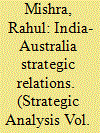

|
|
|
|
|
| Publication |
2012.
|
| Summary/Abstract |
This commentary attempts to put into perspective the recent developments in India-Australia bilateral ties. It argues that economic incentives and strategic calculations have compelled Australia to get closer to India. Australia's decision to supply yellowcake to India, expanding bilateral naval cooperation and Australian Defence Minister Stephen Smith's December 2011 visit should be seen in that context. Australia has realised that it does not make sense to lag behind when countries across the world are jockeying to benefit from India's rise.
|
|
|
|
|
|
|
|
|
|
|
|
|
|
|
|
| 5 |
ID:
114341


|
|
|
|
|
| Publication |
2012.
|
| Summary/Abstract |
The India-Afghanistan relationship is not a simple bilateral engagement. India's Afghan policy is driven by, and is dependent on, many extraneous factors such as India's troubled relationship with Pakistan, its search for a land transit to Central Asia through Iran and Afghanistan and its concerns regarding use of Afghan territory by Pakistan to the detriment of Indian interests. Given the geographical constraints, India has relied on Iran for land access to Afghanistan. This has been complicated by Iran-US relations -the two countries with whom India shares common interests. India has also tried to address Pakistani apprehensions regarding its engagement in Afghanistan. Its decision to resume bilateral dialogue in spite of domestic pressures against any such initiative post-Mumbai and the inclusion of Balochistan in the joint statement issued at Sharm-al-Sheikh in 2009 are part of New Delhi's policy to build confidence with Islamabad. Simultaneously, India has gained enormous political capital through its economic engagement with other countries of the region. This is likely to help it to sustain its presence in Afghanistan after 2014, when the Taliban may well be a part of the government in Kabul.
|
|
|
|
|
|
|
|
|
|
|
|
|
|
|
|
| 6 |
ID:
114350
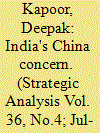

|
|
|
|
|
| Publication |
2012.
|
| Summary/Abstract |
China and India are two of the fastest growing economies of the world today. While it may seem like the proverbial hare and tortoise race, with China way ahead, there is no denying the fact that both economies will be looking for additional energy resources, mineral resources, secure lines of communication, higher productivity at lower cost and finally, of course, larger markets to sustain this growth. While it has been suggested that there is ample scope and space for both economies to grow in an atmosphere of friendly competition, in a world where nationalism is at the core of international relationships the possibility of confrontation is not only inherent but inbuilt. Unresolved boundary issues between the two further enhance this possibility.
|
|
|
|
|
|
|
|
|
|
|
|
|
|
|
|
| 7 |
ID:
114347
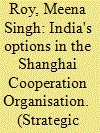

|
|
|
|
|
| Publication |
2012.
|
| Summary/Abstract |
In June 2011, the Shanghai Cooperation Organisation (SCO), an influential Eurasian regional grouping consisting of Russia, China and four Central Asian Republics (CARs)-Uzbekistan, Kazakhstan, Tajikistan and Kyrgyzstan-formally approved a 'memorandum of obligation', which will now enable non-member countries to apply for SCO membership. India is an observer in the SCO and has expressed its desire to play a larger and more meaningful role as a full member of the organisation. Russia and the Central Asian states have always been very supportive of India's entry into the SCO as a full member but it was only recently that New Delhi expressed its desire to join the organisation as such.
On 17 August 2011, India's foreign minister said: 'India's entry into SCO will not only add value but also enhance stature of the organisation… . This is an important grouping'. 1 He also informed the Rajya Sabha ('House of the States', the Upper House of India's parliament) during Question Hour 2 that he was in touch with his counterparts in the SCO member countries regarding India's case for full membership and had received positive responses from them. In this context, some key issues related to India's full membership and its options of engagement with the SCO require a comprehensive analysis. It is important to examine the implications of full membership for India in the context of the new rules approved in the last SCO summit meeting in Astana and to explore whether there is a case for India to join the SCO as a full member. What will India gain as a full member? What are its options in the SCO? And finally, what challenges may it face as a full member? Such an analysis would help India in developing a mid- and long-term strategy for effective engagement with the SCO.
|
|
|
|
|
|
|
|
|
|
|
|
|
|
|
|
| 8 |
ID:
114348


|
|
|
|
|
| Publication |
2012.
|
| Summary/Abstract |
This commentary will begin by giving a background of the 'New Silk Road' and its different versions, moving on to a discussion of the geopolitical and economic factors related to it. The commentary will then try to analyse some of the critical obstacles to the 'New Silk Road' and also make recommendations for a more acceptable and feasible project within the current geopolitical set-up.
|
|
|
|
|
|
|
|
|
|
|
|
|
|
|
|
| 9 |
ID:
114351
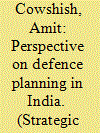

|
|
|
|
|
| Publication |
2012.
|
| Summary/Abstract |
The available literature on defence planning in India does not make for very encouraging reading. A few things stand out. Firstly, there is an acute dearth, if not almost complete absence, of authentic official accounts and analysis of what has gone on in the name of defence planning over the last six decades. Secondly, narratives based either on personal recollection or on opinions and views of those who have directly or indirectly been associated with defence planning at different points of time have filled this void. Others have chipped in too. Many of these opinions and views are based on a subjective interpretation of facts. Thirdly, systemic reforms in the area of defence planning do not appear imminent. The basic problem, of course, is the absence of an official account of defence planning, which has hampered objective analysis and research.
|
|
|
|
|
|
|
|
|
|
|
|
|
|
|
|
| 10 |
ID:
114337


|
|
|
|
|
| Publication |
2012.
|
| Summary/Abstract |
Currently, India's nuclear doctrine is one of inflicting 'unacceptable damage' in case of nuclear first use against it or its forces anywhere. The problem with this is that at current levels of vertical proliferation it is liable to face a counter strike of equal proportions. This may not be in India's interests when viewed in relation to the inevitable setback to its trajectory of progress. Therefore, there is a case for terminating nuclear exchanges at the lowest possible level in case of nuclear first use of low opprobrium quotient or violence. This article recommends a shift to flexible nuclear retaliation with 'deterrence by denial' informing lower-order first use and 'deterrence by punishment' continuing for higher-order attacks.
|
|
|
|
|
|
|
|
|
|
|
|
|
|
|
|
| 11 |
ID:
114346


|
|
|
|
|
| Publication |
2012.
|
| Summary/Abstract |
The nature of international politics is changing with respect to two key developments: the relative decline of the United States and the gridlock in major global international institutions like the United Nations and the World Trade Organisation. The emerging strategies of two different countries, the United States and India, suggest that international relations will increasingly take place in other arenas, specifically in regional groupings, bilateral networks and transnational ties.
|
|
|
|
|
|
|
|
|
|
|
|
|
|
|
|
| 12 |
ID:
114338
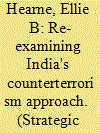

|
|
|
|
|
| Publication |
2012.
|
| Summary/Abstract |
This article looks at the status quo of Indian counterterrorism policy-which largely favours 'physical' or 'hard' measures-and proposes that the government adopt a more holistic strategy. Termed 'Countering Violent Extremism', this would involve measures geared towards long-term prevention, with greater attention paid to the reasons for which people commit terrorism and to the impact of counterterrorism on communities. As such, the article focuses on 'counterradicalisation' (society-wide prevention), 'deradicalisation' (a nuanced response to convicted terrorists) and uses Islamism as a case study, with the proviso that many 'countering violent extremism measures' can also be applied successfully to other types of violent extremism.
|
|
|
|
|
|
|
|
|
|
|
|
|
|
|
|
| 13 |
ID:
114340
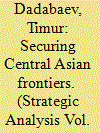

|
|
|
|
|
| Publication |
2012.
|
| Summary/Abstract |
This article develops the message that the artificially introduced administrative borders during the Soviet era, which were subject to the processes of re-delimitation after 1991, whether for reasons of security, administration, mutual distrust or the population's ethnic attachment, have become results and means of political manipulation and pressurisation. This has resulted in further pushing regional states to follow mutually exclusive policies. Although for most of these states, border delimitation is not an objective but a declared way of achieving their security, the process of delimitation detailed below casts doubts on whether border delimitation, even if successful, would actually mean increased security for the region under the prevailing conditions of unilateralism and mutual distrust.
|
|
|
|
|
|
|
|
|
|
|
|
|
|
|
|
| 14 |
ID:
114344


|
|
|
|
|
| Publication |
2012.
|
| Summary/Abstract |
The 2005 US-India nuclear pact created ripples of controversy and debates within in a short period of time. In the US, the nuclear agreement was weighed vis-à-vis the non-proliferation regime-does it strengthen or weaken the regime? On the contrary, in India concerns were raised regarding the implications for India's strategic as well as civilian nuclear programmes. This article highlights the disjuncture in the concerns raised in the US and India. Using David Mutimer's constructivist analysis, it is argued that this divergence is due to their contrasting perspectives on nuclear technology as regards 'proliferation' and 'disarmament-development'.
|
|
|
|
|
|
|
|
|
|
|
|
|
|
|
|
| 15 |
ID:
114345
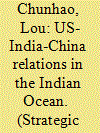

|
|
|
|
|
| Publication |
2012.
|
| Summary/Abstract |
The Indian Ocean Region (IOR) is becoming increasingly significant in the world arena, with the United States, India and China-the most important stakeholders in the region-playing substantial roles. Judging from the three countries' strategic thought, concerns, interests and power balances, it is the US-India potential competition for maritime dominance in the IOR that demands the most attention. However, competition does not mean confrontation. Since the three countries face similar security challenges and share common interests in the IOR, it is necessary for them to compete to a reasonable extent while pushing forward with functional cooperation. Because of the existence of an interdependent relationship and common security challenges, the future scenario will be one of dynamic and manageable competition, instead of inevitable conflict and rivalry.
|
|
|
|
|
|
|
|
|
|
|
|
|
|
|
|
|
|
|
|
|